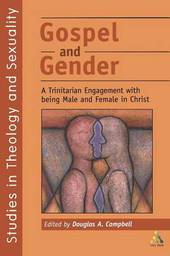
|
Gospel and Gender: A Trintarian Engagment with Being Male and Female in Christ
Paperback / softback
Main Details
| Title |
Gospel and Gender: A Trintarian Engagment with Being Male and Female in Christ
|
| Authors and Contributors |
Edited by Douglas Campbell
|
| Series | Religious Studies: Bloomsbury Academic Collections |
|---|
| Physical Properties |
| Format:Paperback / softback | | Pages:240 |
|
| Category/Genre | Christianity |
|---|
| ISBN/Barcode |
9780567083500
|
| Classifications | Dewey:220 |
|---|
| Audience | | Tertiary Education (US: College) | |
|---|
|
Publishing Details |
| Publisher |
Bloomsbury Publishing PLC
|
| Imprint |
Continuum International Publishing Group Ltd.
|
| Publication Date |
1 December 2003 |
| Publication Country |
United Kingdom
|
Description
The contributors to this volume are convinced that previous engagements from Christian perspectives with the question of gender have tended to focus on female problems and viewpoints in isolation, or, conversely, on male problems and viewpoints. It seemed particularly important to try to unite reflections on both genders within one discussion on the assumption that such a consideration would yield more than the sum of two parts. Furthermore, that consciously relational reflection was to be attempted in specific dialogue with trinitarianism; another rather neglected area in the gender debates. And thus yields reflections in two directions: the impact of the Trinity on gender discussions, alongside a consideration of the impact of gender constructions on our conceptions of the Trinity.
Author Biography
Douglas A. Campbell is currently Assistant Professor of New Testament in the Divinity School, Duke University, Durham, North Carolina, USA. He is the author of numerous scholarly articles on aspects of the Apostle Paul's life and thought.
ReviewsReview ~ Internatioanl Review of Biblical Studies, vol 51, 2004/05 The insight to combine gender and Trinitarian thinking in this book is undoubtedly an important one. Like relationships between individuals, discussion here shows that diverse areas can be integrated to produce something over and above their respective parts, both being enriched as a result. -- Louise Lawrence, University of Glasgow * Expository Times *
|